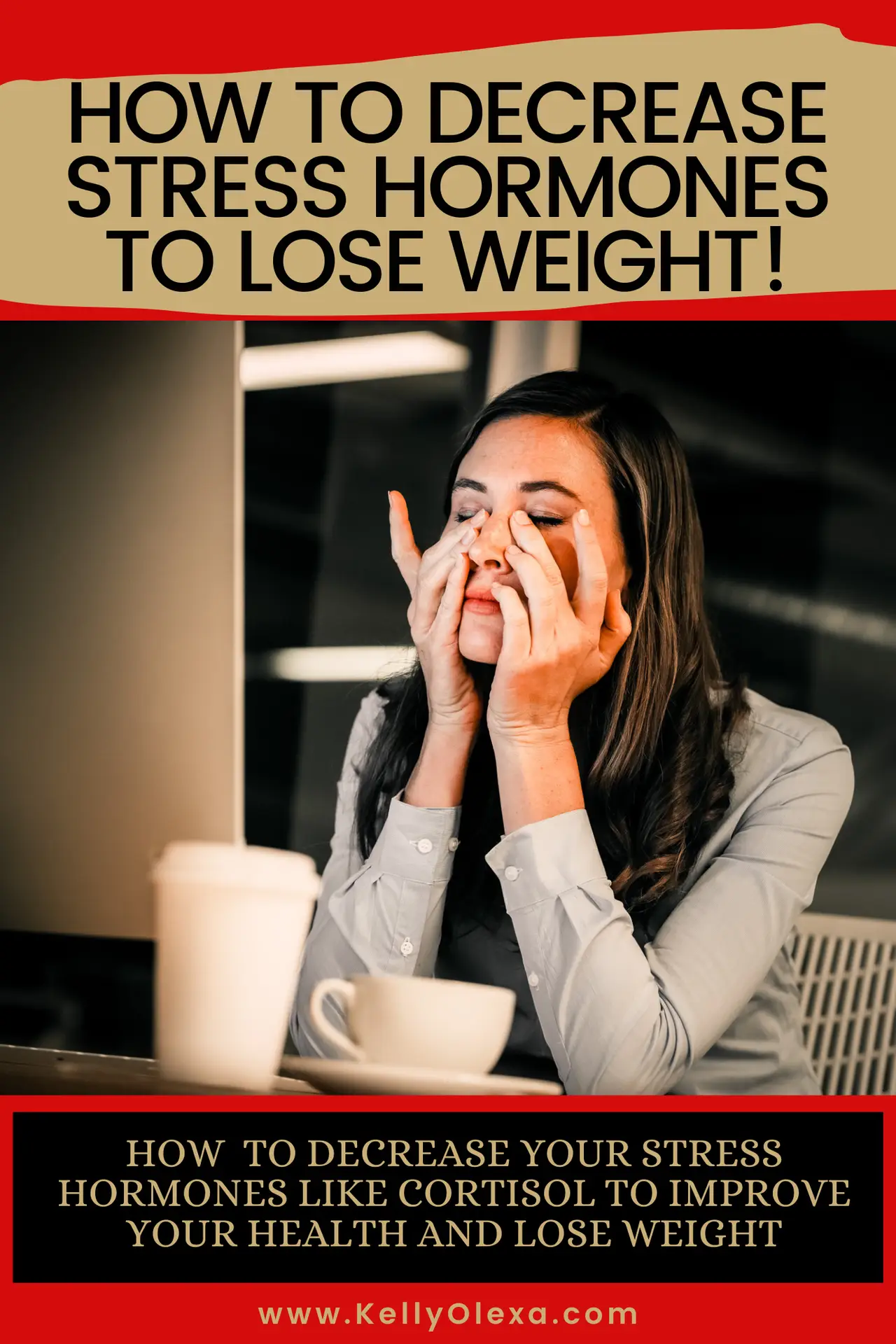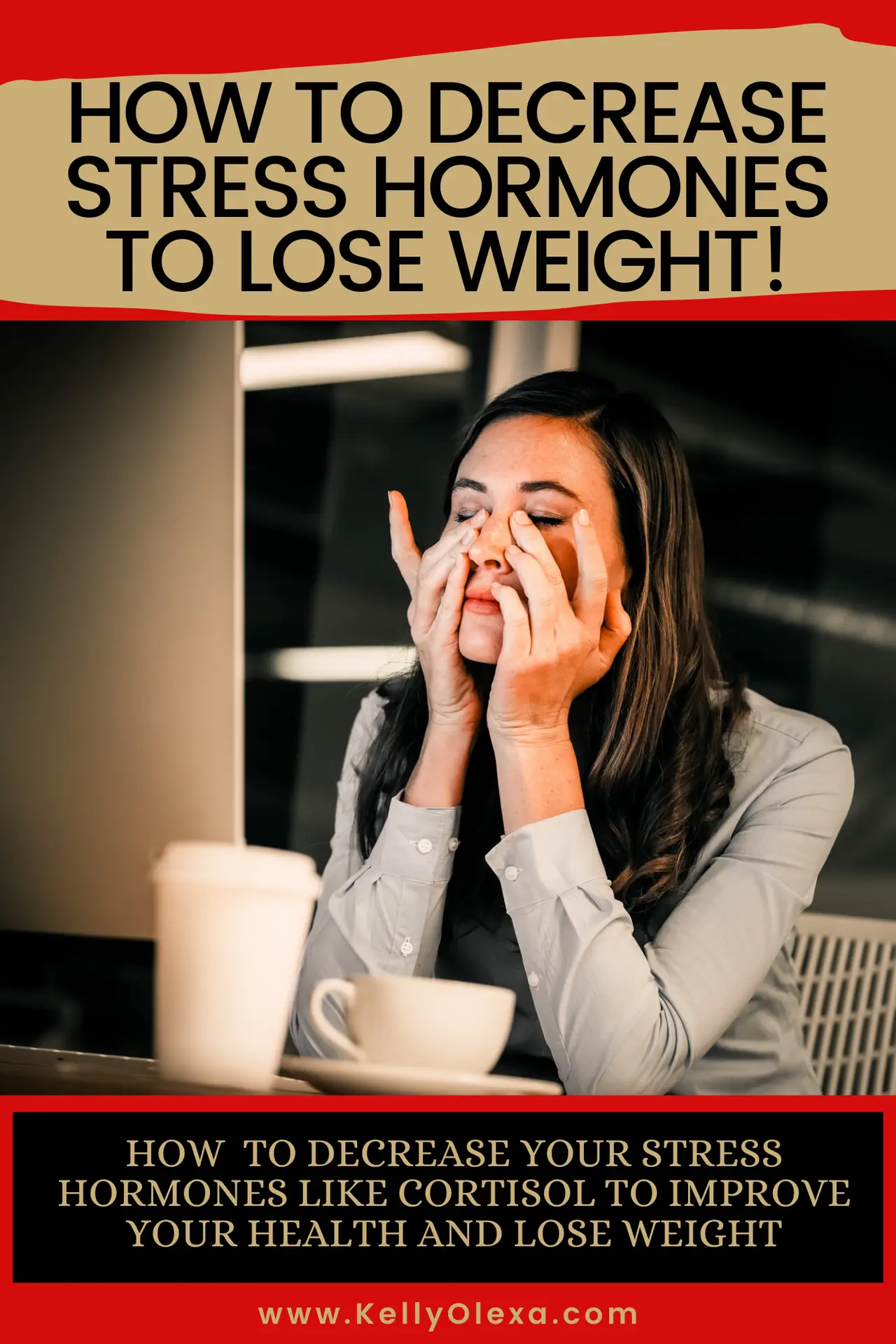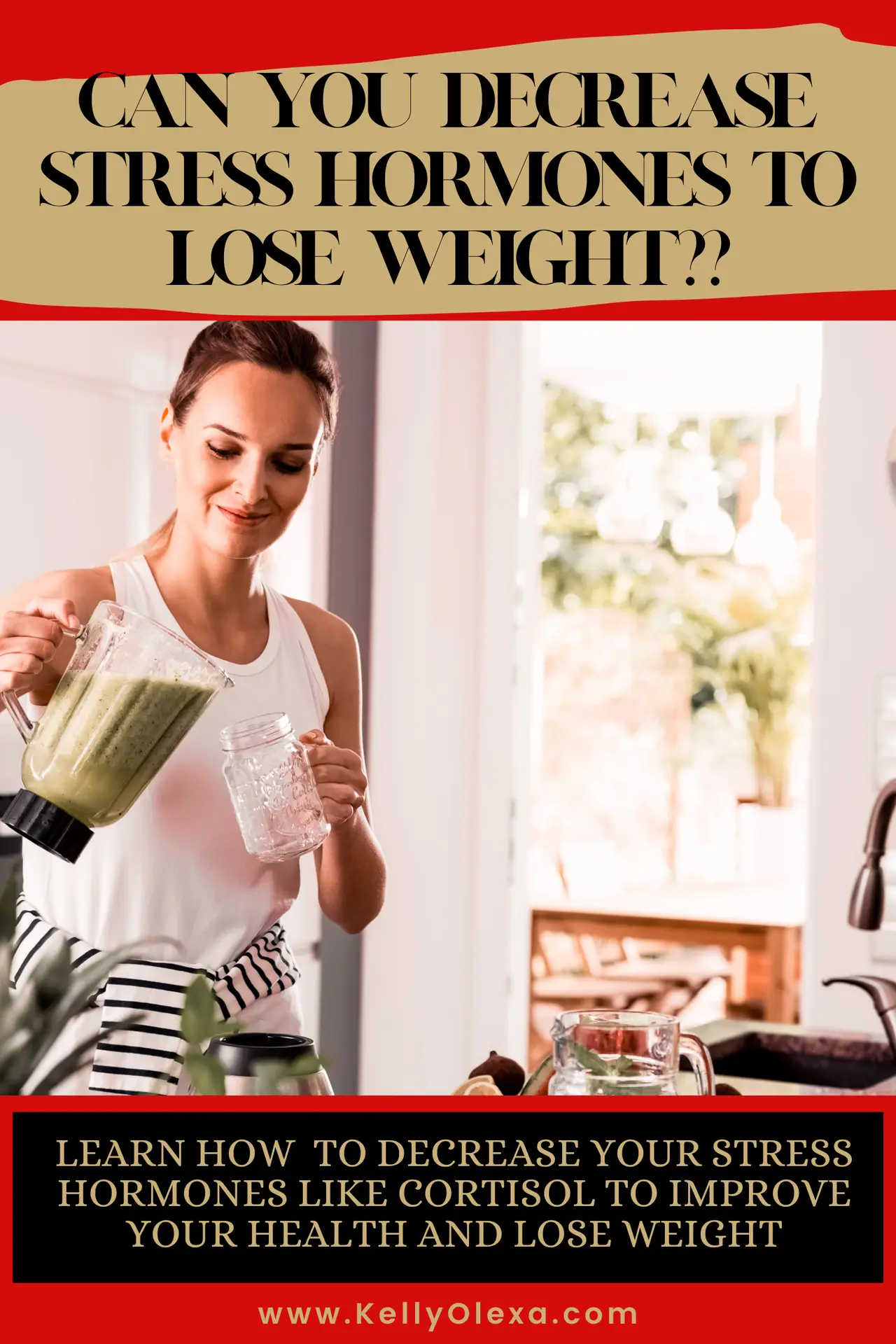How You Can Decrease Stress Hormone Levels

If you are wondering how to decrease stress hormones for weight loss and ultimately better health, you are in the right place. It’s likely you are concerned about high cortisol or possibly adrenal fatigue or imbalanced hormones in general. All of these are factors to be considered. For the record, I have personally experienced ALL of these issues- and will address them either in this post or will link to another post/video for you so you can get some next steps and help.
The good news is that while hormones and attaining hormone balance is not easy or fast, it is absolutely doable and is HIGHLY RECOMMENDED because, oh my goodness your life can be remarkably better once you DO achieve better hormonal balance.
Further, when you are dealing with elevated stress hormones, you can likely encounter a myriad of physical and mental symptoms that can dampen every area of your life. In this post, I’ll address how you can decrease stress hormones by making lifestyle changes, dietary changes and being proactive in the future to prevent future issues. Let’s get started.
WHY IS STRESS SO HARMFUL TO OUR HEALTH?

In the crazy cadence of everyday modern life, stress has become an unwelcome companion for many of us. It creeps into our lives, infiltrating our minds and bodies, and wreaking havoc on our state of mind.
Little bitch.
What makes stress such a formidable adversary? Why does it possess the power to disrupt our equilibrium and compromise our health?
Stress hormones like cortisol in particular have a profound impact on our physiological and psychological functioning. This is why lowering cortisol has become such a hot topic for so many of us recently. Everyone is talking about cortisol but few really understand how it works.
Imagine your body as a finely tuned orchestra (oh yea, that metaphor is back!), with each system harmonizing to maintain musical equilibrium.
Now, picture stress as the off-key note that throws the entire symphony into total freak-out mode.
When faced with any perceived threat or challenge, our body initiates a cascade of physiological responses, collectively known as the “stress response”. Cortisol is often dubbed the “stress hormone.” Produced by our adrenal glands, it is a potent force, mobilizing energy reserves, sharpening your focus, and priming the body for action.
This response can be life-saving when necessary, enabling us to confront danger or navigate demanding situations with heightened vigilance.
The reality is, it’s not often we are faced with such life-threatening situations. It’s more often that we are faced with day-to-day stressors, and our body tends to react in the same manner.
It is when stress becomes chronic or continues unabated, cortisol lingers in the bloodstream, exerting a corrosive influence on our health.
The insidious effects of chronic stress permeate every facet of our being, creating a devastating toll on both mind and body.
Prolonged exposure to elevated levels of cortisol can wreak havoc on our cardiovascular system, increasing the risk of hypertension, heart disease, and stroke.
When my cortisol was at its highest, I would get so exhausted every day, precisely at 4pm I would literally feel like I was coming down with the flu. I’d collapse on the couch and was completely unable to work. Then the next day after a good night of sleep I’d be “reset” and able to work for half a day until that fatigue hit me again. Horrible cycle!
How did I get there? Truthfully, it was a combination of being a workaholic and also being so concerned with losing weight that I was overtraining and over-dieting. I was pushing my body too hard and was in constant fight-or-flight mode. Something had to give. I think a lot of you reading this post are probably in the same boat. And guess what– all that pushing myself– I could not lose weight. Go figure.
Our immune system doesn’t fare much better. Under the nonstop assault of stress hormones, we become more susceptible to infections and sickness.
Beyond its physical manifestations, stress casts a long shadow over our mental well-being, fueling anxiety and exacerbating mood disorders. The relentless churn of worries and concerns erodes our resilience, leaving us vulnerable to burnout and emotional exhaustion.
Have you been there? I know I have.
Amidst the grim prognosis, there is hope. The journey to stress reduction begins with awareness and intentionality.
By acknowledging the detrimental effects of stress on our health, we empower ourselves to take proactive steps towards restoration and resilience.
Through mindfulness practices, relaxation techniques, and lifestyle modifications, we can recalibrate our own stress response and cultivate a greater sense of equilibrium.
I really encourage you to embark on a transformative journey for yourself if you recognize that your stress is affecting your health, because it can really only get worse. But the GREAT thing is, YOU CAN MAKE IT GET BETTER AND BETTER!!
UNDERSTANDING THE IMPACT OF STRESS HORMONES

I’m sure you know by now that stress is far more than just a mental strain—it’s a physiological phenomenon with serious negative implications on our health.
What’s going on in our head ultimately becomes SYMPTOMS. I know this to be true.
Our body responds to stress via its “stress hormones”. . These biochemical messengers, including cortisol and adrenaline, orchestrate a symphony (there’s that crazy metaphor again but it’s really the most apropos way to illustrate hormone stuff!) of reactions intended to prepare us for perceived threats. When triggered by stress, these hormones initiate a cascade of responses, from heightened alertness to increased heart rate, all geared towards survival.
Have you ever found yourself in an argument and experienced an elevated heart rate or found yourself breathing all in your upper chest so that you had to ‘catch your breath’? This is what we are talking about. I have learned the hard way that there are toxic PEOPLE and toxic TOPICS that – as a woman with C-PTSD, I need to avoid at all costs. If I don’t, I end up having major elevated breathing, almost to the point of a panic attack. And this leads to a migraine. Which leads me to being in bed for 3 days. NOT worth it.
You see how stress can, in extreme cases, REALLY throw you for a loop? This is real stuff people.
Want to read a fascinating book– check out The Body Keeps the Score by Bessel Van der Kolk. Also Healing Happens With Your Help, by Carol Ritberger.
As we discussed above, prolonged exposure to elevated levels of stress hormones can have detrimental effects on both the mind and the body. Chronic stress disrupts the delicate balance of our endocrine system, leading to imbalances in hormone production and regulation. This dysregulation can manifest in a myriad of ways, from digestive disturbances to immune suppression.
Often, the impact of stress results in psychological consequences such as anxiety and mood disorders as well.
In order for us to effectively manage our stress and truly get healthy and FEEL well again, we need to understand how these stress hormones work and work with each other. The better we understand how these biochemical signals influence both our physiology and psychology, the better decisions we can make around stress management and reduction.
What Are the Effects of CHRONIC STRESS?

Chronic stress can take a significant toll on physical health, ESPECIALLY in terms of cardiovascular disease.
When your body is under constant stress, it releases stress hormones like cortisol and adrenaline, which can lead to elevated blood pressure and increased heart rate over time.
No bueno.
These physiological changes can contribute to the development of cardiovascular issues such as hypertension, heart disease, and even stroke.
Ladies. Heart disease is the leading cause of death for women in this country. This is not something to ignore.
By managing stress levels effectively, individuals can reduce the strain on their cardiovascular system and lower their risk of these serious conditions.
Another consequence of chronic stress is a weakened immune system. When the body is in a constant state of stress, it becomes less efficient at fighting off infections and illnesses. This can leave individuals more susceptible to colds, flu, and other common ailments.
Chronic stress has also been linked to increased inflammation in the body, which is associated with a range of chronic health conditions. By reducing stress levels, individuals can support their immune system and improve their overall resilience to illness. Check out this post I published on how to lower your inflammation naturally…when I first met with my functional medicine doctor, I recall her saying that her TOP priorities for me were to address my insulin resistance and my inflammation. (Why? Heart disease)
In addition to physical health impacts, chronic stress can also take a significant toll on mental well-being. Anxiety disorders, characterized by excessive worry and fear, are common among individuals experiencing chronic stress. The constant strain of stress can overwhelm the brain’s ability to cope, leading to persistent feelings of anxiety and panic.
Similarly, chronic stress has been linked to depression, a mood disorder characterized by persistent feelings of sadness, hopelessness, and loss of interest in activities.
Furthermore, prolonged exposure to stress hormones can impair cognitive function, leading to difficulties with concentration, memory, and decision-making. By addressing chronic stress and implementing strategies for stress reduction, individuals can protect their mental health and enhance their overall cognitive function.
What is the role of STRESS HORMONES in our body?

Cortisol plays a HUGELY important role in the body’s stress response system. Often referred to as the “stress hormone,” cortisol is released in response to perceived threats or challenges, triggering a cascade of physiological reactions designed to prepare the body for action.
In times of acute stress, cortisol mobilizes energy reserves, sharpens focus, and enhances alertness to help individuals cope with the immediate threat. However, when stress becomes chronic or persistent, cortisol levels can stay elevated for extended periods, leading to a range of negative effects on the body.
Chronically high levels of cortisol have been linked to increased inflammation, impaired immune function, and hormone imbalance, contributing to a variety of health issues such as obesity, diabetes, and cardiovascular disease.
Adrenaline, (also known as epinephrine), is another key player in the body’s stress response. Like cortisol, adrenaline is released in response to stressors, rapidly mobilizing the body’s resources to cope with the perceived threat.
When adrenaline is released, it triggers a surge in heart rate, blood pressure, and energy levels, preparing the body for immediate action.
This “fight or flight” response is essential for survival in dangerous situations, allowing individuals to react quickly and effectively to potential threats. However, prolonged activation of the adrenaline response can lead to chronic stress and associated health problems, including increased risk of heart disease, hypertension, and anxiety disorders.
Overall, stress hormones play a crucial role in the body’s response to stress, helping to mobilize resources and adapt to challenging situations. However, when stress becomes chronic or overwhelming, the constant activation of the stress response can have detrimental effects on physical and mental health. By understanding the role of cortisol and adrenaline in the body’s stress response system, individuals can take steps to manage stress effectively and minimize its impact on their overall well-being.
Bottom line is– we don’t even realize it, but in our modern world, we are reacting to daily stressors with “fight or flight” reactions without even realizing it. We get “stressed out” over money problems, job problems, relationship problems, deadlines, traffic, kids, neighbors, barking dogs, you name it…..we are a stressed OUT society and typically– we are NOT a society focused on CHILLING OUT.
In other words, we are doing a lot of freaking our bodies out and not a lot of calming them down. We need to flip the switch on that and doing so will get our health and our future back on the right track.
Holistic Approaches to Reduce Stress Hormones

Now comes what I call the fun part. How do we start healing our stressed out lives? Speaking from experience, I can tell you that paying attention to your lifestyle and diet and becoming more and more self-aware of your habits, reactions, behaviors etc. is key and will serve you well. And if you read these options below and think- while rolling your eyes, “Oh my GOSH, how is some deep breathing going to help MY anxiety??? I’m too busy for this stuff!!!!”– well, that tells me right there, you are too busy and too stressed NOT to make time for this. And I can say that it’s when you are thinking like that — that’s when life will typically MAKE YOU SLOW DOWN. I recall that I got soooo close to adrenal burnout my doctor told me “Kelly you are about to land in the hospital if you don’t SLOW DOWN and start RESTING and taking breaks!”–
I started listening. I HOPE YOU DO!
Holistic Approaches to Reduce Stress Hormones:
Mindfulness and Meditation:
– Deep Breathing Exercises: Deep breathing techniques, such as diaphragmatic breathing or belly breathing, help activate the body’s relaxation response, reducing levels of stress hormones like cortisol and promoting a sense of calm.

– Guided Imagery: Visualization exercises guided by a trained practitioner can help individuals create mental images that evoke relaxation and reduce stress.
– Body Scan Techniques: Body scan meditation involves systematically focusing attention on different parts of the body, helping to increase awareness of bodily sensations and promote relaxation.
Regular Exercise Routine:
– Cardiovascular Activities:
Aerobic exercises like jogging, walking, swimming, or cycling can help reduce stress hormones and improve mood by increasing endorphin levels, also known as “feel-good” hormones. I’d recommend keeping your cardio on the lower impact like swimming or walking.

– Strength Training: Resistance training exercises, such as weightlifting or bodyweight exercises, can help reduce stress hormones and promote a sense of empowerment and control.

– Yoga and Pilates: These mind-body practices combine physical movement with breath awareness and mindfulness, helping to reduce stress hormones and improve flexibility, strength, and overall well-being. I’ve talked about how much I am loving TheClass.com for yoga right now. It’s a totally unique approach to yoga — they have traditional yoga classes but they are known for “The Class” which is more a twist on yoga that includes I’m going to call it like somatic movement with some cardio-ish movement and a lot of mindfulness thrown in and FANTASTIC MUSIC and will you work your core and glutes every time? oh yes!! Plus they. have meditation and breathwork…they have classes by the TIME, so if you want to choose a class by 15 minutes or 30 minutes or 1 hour or 1 and a half hours or by TYPE of class or by instructor…..I’m in love. They have a free trial where you can test them out for a MONTH – that’s what I did. I think they are the bomb, the women who teach the classes I’m hoping to interview on the podcast coming up they are so…..just have so much to teach about being mindful and fluid and centered. Every class I do, I am more of my future self. Check out TheClass.com and try out their free trial.

Healthy Diet Choices:
– Balanced Nutritional Intake: Consuming a balanced diet rich in fruits, vegetables, whole grains, lean proteins, and healthy fats provides essential nutrients that support overall health and help regulate stress hormones.
– Limiting Caffeine and Sugar: Excessive consumption of caffeine and sugar can lead to spikes and crashes in blood sugar levels, contributing to feelings of stress and anxiety. Limiting intake can help stabilize energy levels and promote a more balanced mood.
– Incorporating Stress-reducing Foods: Certain foods, such as fatty fish rich in omega-3 fatty acids, dark leafy greens, and foods high in antioxidants, can help reduce inflammation and lower levels of stress hormones in the body.
Adequate Sleep Hygiene:
– Establishing a Bedtime Routine: Creating a consistent bedtime routine signals to the body that it’s time to wind down and prepare for sleep, helping to reduce stress hormones and improve sleep quality.
– Creating a Relaxing Sleep Environment: Optimizing the sleep environment by minimizing noise, light, and distractions can promote relaxation and help reduce levels of stress hormones before bedtime.
– Prioritizing Restful Sleep: Prioritizing sufficient and restful sleep is essential for regulating stress hormones, supporting overall health, and promoting resilience to stressors in daily life.walking
BUT WAIT, THERE'S MORE!

If you liked this post and want to learn more, you’ll probably want to check out these posts. How to Reduce Inflammation Naturally. Blog: How Much Protein Do Women Need? Blog: How to Reset Female Hormones to Lose Weight. BLOG: How to stop hormonal weight gain. Want to reduce inflammation with the KETO Diet? Grab my FREE Keto Kwik Start Guide. Take that up a notch with my Keto Cookbook just $9.95, it’s got all the great low-carb recipes I still make every week, the ones that helped me lose 36 inches and 34lbs!!
AFFILIATE DISCLAIMER
Note: this blog contains affiliate links that allow you to find the items mentioned in this post and support this channel at no cost to you. While this channel may earn minimal sums when a viewer uses the links provided, the view is in NO WAY obligated to use these links. Thank you for your support.

Tirzepatide vs Semaglutide For Weight Loss: My Personal Experience Reaching My Lowest Weight on Tirzepatide.

The Commodore Perry Estate in Austin Texas. An Experience That Must Be Repeated Regularly.

How to Decrease Stress Hormones For Weight Loss and Better Health.

How to Stop Hormonal Weight Gain. Can You Reset Your Female Hormones Naturally?

How to Reset Female Hormones to Lose Weight. Don’t Learn The Hard Way!





